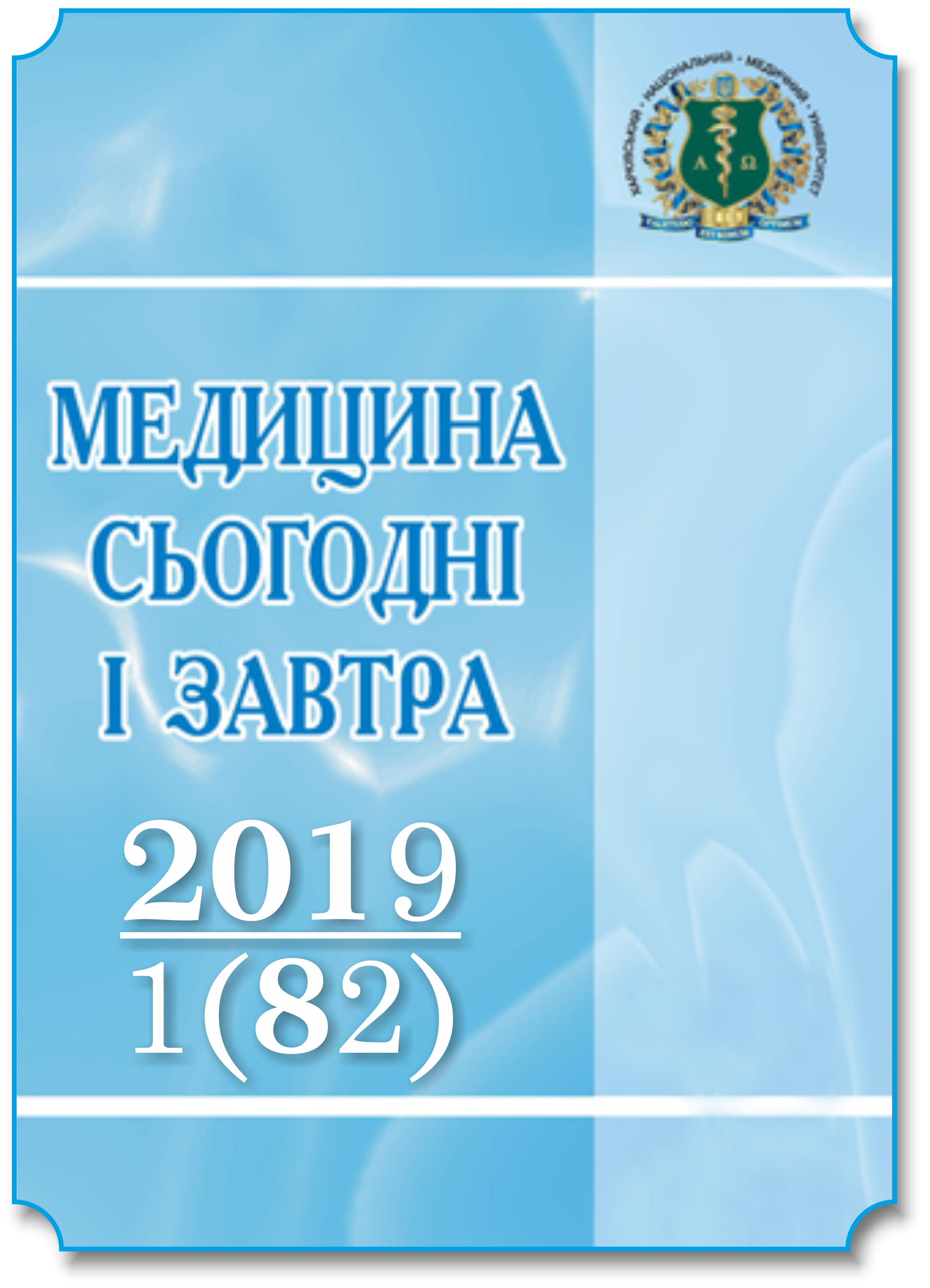Анотація
Вивчали динаміку стану когнітивної функції за шкалою MMSE в пацієнтів молодого, середнього та похилого віку після операції з використанням загальної анестезії на тлі нейропротекторної терапії. Установлено, що в пацієнтів середнього віку на тлі нейропротекторної терапії відбувається погіршення стану когнітивної функції меншою мірою, зі швидким відновленням і поліпшенням, ніж у пацієнтів молодого віку, що, можливо, пов’язано з віковими особливостями когнітивної функції – її пластичністю.
Посилання
Usenko L.V., Rizk Shadi Yeid, Krishtafor A.A., Kaniuka H.S., Kusch I.P. (2008). Profilaktika i korrektsiia posleoperatsionnykh kohnitivnykh disfunktsii u bolnykh pozhiloho vozrasta (metodicheskiie rekomendatsii) [Prevention and correction of postoperative cognitive dysfunction in elderly patients (guidelines)]. Dnepropetrovsk: Dnepropetrovsk State Medical Academy, 60 p. [in Russian].
Usenko L.V., Polinchuk I.S. (2011). Kohnitivnyie narusheniia posle obshchei anestezii pri ekstrakardialnykh vmeshatelstvakh i effekt ranneho vvedeniia tiotsetama v posleoperatsionnom periode [Cognitive impairment after general anesthesia with extracardiac interventions and the effect of early administration of thiocetam in the postoperative period]. Mezhdunarodnyi nevrolohicheskii zhurnal – International Neurological Journal, № 6 (44), pp. 65–69 [in Russian].
Usenko L.V., Rizk Shadi Yeid, Krishtafor A.A., Kaniuka H.S., Kusch I.P. (2008). Profilaktika i korrektsiia posleoperatsionnykh kohnitivnykh disfunktsii u bolnykh pozhiloho vozrasta [Prevention and correction of postoperative cognitive dysfunction in elderly patients]. Mezhdunarodnyi nevrolohicheskii zhurnal – International Neurological Journal, № 4 (20), pp. 87–94 [in Russian].
Chen X., Zhao M., White P.F., Li S., Tang J., Wender R.H. et al. (2001). The recovery of cognitive function after general anesthesia in elderly patients: a comparison of desfluran and sevofluran. Anesth. Analg., vol. 93, pp. 1489–1494.
Cottrel J.E. (2008). We care, therefore we are: anesthesia-related morbidity and mortality. The 46th rovenstine lecture. Anesthesiology, vol. 109, № 3, pp. 377–388.
Kadoi Y., Goto F. (2007). Sevoflurane anesthesia did not affect postoperative cognitive dysfunction in patients undergoing coronary artery bypass graft surgery. J. of Anesthesia, vol. 21, № 3, pp. 330–335.
Newman S., Stygall J., Hirani S., Shaefi S., Maze M. (2007). Postoperative cognitive dysfunction after noncardiac surgery: a systematic review. Anesthesiology, vol. 106 (3), pp. 572–590.
Rasmussen L.S., Jonson T., Kuipers H.M., Kristensen D., Siersma V.D., Vila P. et al. (2003). Does anesthesia cease postoperative cognitive dysfunction? A randomized study of regional versus general anesthesia in 438 elderly patients. Acta Anesth. Scand., vol. 47, № 9, pp. 1188–1194.
Isaiev S.V., Likhvantsev V.V., Kichin V.V. (2004). Vliianiie perioperatsionnykh faktorov i vybora metoda anestezii na chastotu kohnitivnykh rasstroistv v posleoperatsionnom periode [The influence of perioperative factors and the choice of anesthesia method on the incidence of cognitive impairment in the postoperative period]. Proceedings from IX siezd Federatsii anesteziolohov – IX Congress of the Federation of Anesthesiologists (pp. 113–114). Irkutsk. [in Russian].
Fedorovskii N.M., Kosachenko V.M., Korsunskii S.B., Kutina O.A. (2003). Monitorirovaniie transkranialnoho krovotoka pri rehionarnoi anestezii u lits pozhiloho i starcheskoho vozrasta [Monitoring transcranial blood flow during regional anesthesia in the elderly]. Rossiiskii meditsinskii zhurnal – Russian Medical Journal, № 3, pp. 23–26 [in Russian].
Shnaider N.A. (2006). Novyi vzhliad na problemu posleoperatsionnoi kohnitivnoi disfunktsii [A new look at the problem of postoperative cognitive dysfunction]. Ostryie i neotlozhnyie sostoianiia v praktike vracha – Acute and emergency conditions in the practice of a doctor, № 5, pp. 47–49 [in Russian].
Shnaider N.A., Shprakh V.V., Salmina A.B. (2005). Posleoperatsionnaia kohnitivnaia disfunktsiia: profilaktika, diahnostika, lecheniie. Metodicheskoie posobiie dlia vrachei [Postoperative cognitive dysfunction: prevention, diagnosis, treatment. Toolkit for doctors]. Krasnoyarsk: Operativnaia polihrafiia, 95 p. [in Russian].
Davydova N.S. (2004). Vozmozhnyie kriterii prohnoza narushenii mozhovoho krovoobrashcheniia pri anestezii [Possible criteria for predicting cerebrovascular accidents during anesthesia]. Vestnik intensivnoi terapii – Intensive Care Bulletin, № 5, pp. 232–234 [in Russian].
Zakharov V.V., Yakhno N.N. (2003). Narusheniie pamiati [Impaired memory]. Мoscow: GEOTAR-Media, 150 p. [in Russian].
Solovieva L.A., Hriaznov K.A., Kokhno V.N., Yelizarieva N.L., Shmakov A.N., Kondakov V.I. (2012). Posleoperatsionnyie kohnitivnyie narusheniia u heriatricheskikh bolnykh i ikh profilaktika [Postoperative cognitive impairment in geriatric patients and their prevention]. Meditsina i obrazovaniie v Sibiri – Medicine and Education in Siberia, № 6. Retrieved from http://www.ngmu.ru/cozo/mos/article/text_full.php?id=872 [in Russian].
Damulin I.V. (2002). Bolezn Altsheimera i sosudistaia dementsiia [Alzheimer’s disease and vascular dementia]. N.N. Yakhno (Ed.). Мoscow, 85 p. [in Russian].
Zakharov V.V., Damulin I.V. (2000). Diahnostika i lecheniie kohnitivnykh narushenii u pozhilykh: metodicheskiie rekomendatsii [Diagnosis and treatment of cognitive impairment in the elderly: guidelines]. N.N. Yakhno (Ed.). Мoscow: MMA im. I.M. Sechenova, XX p. [in Russian].
Jnhagen M.E. (2000). Nerve growth factor treatment in dementia. Alzheimer. Dis. Assoc. Disord., vol. 14 (suppl. 1), pp. 31–38.

